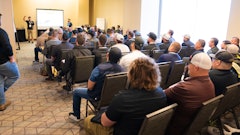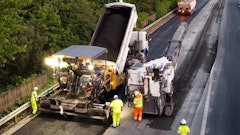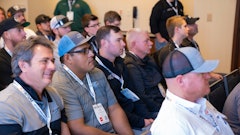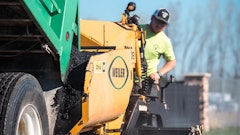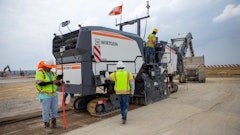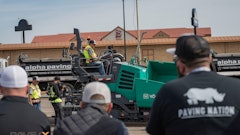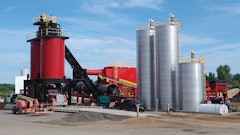
On August 30, 2019, the World Sweeping Association was contacted by one of its members about a new third-party vendor, CBRE, which had taken over oversight of the member’s Walmart accounts. The WSA member was concerned about two changes CBRE presented:
- CBRE was requiring vendors to pay $425 for what that company termed a “background check,” even though the contractor had long been an established vendor for Walmart
- CBRE could take up to 60 days to pay for completed sweeping work, up from the current, industry standard, 30-day payment time period. (This particular contractor said they usually received payment within 14 days).
WSA contacted both Walmart and CBRE. WSA took the position that the $425 background check was onerous given that a contract was already in place with the affected sweeping contractors. WSA also provided Walmart with an extrapolation of the expense burden that would be added to sweeping contractors in the event that CBRE were to gain oversight of all 5,000 Walmart locations in the US and Puerto Rico:
Assuming that a contractor sweeps, on average, 10 Walmart locations, 500 contractors would have to come up with an additional $425 even though they had an existing contract at an existing price. This would amount to an additional total out-of-pocket for those contractors of $212,000 ($425 x 500).
Again assuming each contractor sweeps 10 Walmart locations, and further assuming a charge of $45 per sweep, WSA argued that, should Walmart contract with CBRE throughout the country, a payment change from the current 30-day average to a 60-day payment schedule would double the line of credit/financing burden to contractors around the country to meet CBRE’s requirements.
While to-date CBRE has not responded to WSA, Dale Brantley, Walmart Senior Manager of Exterior Services did reach out and following is a transcript of his conversation with Range Kidwell-Ross, WSA director. Brantley, who is responsible for sweeping, landscaping and snow removal/abatement for Walmart properties, said he had called to provide direct information about the various issues raised by WSA.
WSA: First off, Dale, thank you very much for giving us a call to explain Walmart’s corporate thinking on the issues we brought up.
Brantley/Walmart: You’re welcome. I must say I wish all of our vendor groups had an association like WSA that would notify us about issues they see with doing work for Walmart. As our first topic, allow me to discuss the recent change to sweeping frequency.
In our contract, Walmart specifies that sweeping frequency may be changed as long as we give our providers at least a seven-day notice. One concern I recall WSA had in that frequency reduction was that there was no contract re-bidding, or included increase in price-per-sweep.
Although it is entirely within our right to change frequency, in such a situation a contractor is welcome to ask for a reasonable price increase per sweep. For example, we did not turn down anyone who asked for a $10/sweep increase or less. However, on the other end of the scale, if a contractor notified us that they wanted to make up the entire amount, our response was to give them a 15-day notice. My point is that we are willing to work with our contractors with any reasonable request.
On the topic of CBRE: It is their requirement to charge each sweeping contractor a $425 fee, per company, to get them set up in their system. My understanding is that reimburses them for doing some sort of check on the company and I’m not sure what else. Those are CBRE’s requirements: if a vendor chose not to pay it then they were terminated. BTW, I think this is a yearly charge by CBRE.
As for the issue of extending payment to contractors out to as much as 60 days: The payment time period is based on when a provider invoices. This can be done within 72 hours of when service has been provided, which is the time it takes to go through our ServiceChannel check-and-balance routine with our store managers; standardly CBRE can be invoiced weekly.
Walmart’s week starts on Sunday and ends on Saturday. Including the three days referenced above, that means a contractor’s time can be billed and confirmed within 10 days after a given work week starts. CBRE is on a net 30-payment schedule with Walmart.
For that reason, we suggest that vendors invoice on Wednesday. As part of our Walmart protocol, the store managers get an email that provides them with an opportunity to mark the work done as unsatisfactory. If that’s the case, the vendor is contacted to work the situation out.
WSA: What can you say about the situation where Walmart says in its RFP that it prefers working directly with contractors; yet, when a contractor has been working for a third party provider (for this example we will use the third party vendor, Divisions, whose contracts are known to have such a clause), the contractor/Divisions contract disallows the contractor to take on the work directly?
If you want to make sure Walmart can work with contractors directly, why not require Divisions and other third party vendors to maintain a contractor contract that does not have such a clause?
Brantley/Walmart: As long as they are a registered vendor with us then an individual contractor can take over the Walmart accounts it’s been sweeping; however, that’s only in the case the third party vendor (again, using Divisions as the example) has been fired. But we don’t just terminate; there’s an escalation process that we go through. We call Divisions, as well as any direct service providers with us, and we say “We have a problem.” We then email them with an invitation to fix the problem. If the problem can’t be solved at that point, then we terminate the provider for that location. Then we can, in turn, hire that same sweeping service provider — provided that company’s poor work habits were not the reason the third party vendor was terminated. If it was, then as you might imagine we don’t want them on a direct basis, either.
In our bid process, though, Divisions has the contractor right where they wanted them (via the contract language) because Divisions wasn’t getting fired. Rather, they were getting underbid by the contractor. The problem that happens there (with an RFP where the contractor is bidding on work currently held by Divisions) is the contractor knows what they’re getting paid per sweep today, so they know Divisions must be getting paid more.
This allows the contractor to bid so as to just undercut Divisions. That’s why the NDA clause in Divisions’ contract is there. Again, if Divisions gets terminated for quality and the escalation process is followed then we can absolutely hire another provider. I cannot turn around and have the store manager tell me that Company A is currently doing the work for Divisions and they want to fire Divisions and hire Company A. That’s not fair to Divisions, as well as gets Company A in trouble, and so we won’t do that.
WSA: When a contractor bids on the accounts where they have been providing sweeping services to Walmart, but they’ve been doing the work through Divisions, they don’t actually know what Divisions has been getting paid. They just know what they’re getting paid and that Divisions must be getting something out of the deal, as well.
However, if they bid on the account directly — as contractors were encouraged to do in Walmart’s last RFP — they actually have no path to being able to sweep the stores directly is what I hear you saying, since Divisions hasn’t been fired, just underbid.
Brantley/Walmart: That’s correct. Let me put the example another way: Let’s say you’ve been getting paid $50 a sweep. You don’t know what Divisions is getting paid, just what you’re getting. In your mind, you might well figure that Divisions is getting, just throwing numbers out there, $60. So you can bid a little more than you’re now getting, knowing what Divisions has been paying you to sweep. You’re able to undercut Divisions solely based on knowing what they paid you to sweep the parking lot. That’s when you get into trouble with Divisions.
WSA: Our pushback on that is: Walmart puts out an RFP for certain stores in an area where Company A is currently sweeping for Divisions. The Walmart RFP emphasizes that the company would prefer working directly with contractors. So, Company A bids the work.
However, Divisions has contract clauses that act, in essence, as a non-compete (NDA): The upshot is that any contractor now doing work for Divisions — again just using Divisions as an example — is unable to service the account on a direct basis no matter how long they’ve been doing a good job sweeping the Walmart location.
Our point is that we believe Walmart would be better served not to allow such NDAs between contractors and third party vendors. Because of the NDAs, the only sweeping companies you can solicit with a ‘contractor preferred RFP’ are ones not currently sweeping through a third party provider.
Brantley/Walmart: That could be. I want to make it clear, however, that we don’t reach out to everyone for a Walmart bid. We only do so for companies with a Walmart Tender Number; to receive one of those, a contractor must meet a number of required criteria. There are probably hundreds or thousands of parking lot sweeping contractors that don’t want to meet our requirements, that don’t want to carry our required umbrella amount for insurance, etc. Some local providers work for Divisions because they don’t have to carry the amount of insurance that Divisions carries on their behalf.
Again, though, I would much rather hire somebody who self-performs, where I can deal with them on a one-on-one basis. However, I can tell you that Divisions gets it done cheaper. They hire self-performers at a rate where, if I hire them on my own based upon them having to carry the insurance as well as meet our other requirements, their costs typically end up being higher than what we pay with Divisions.
And, when a contractor underbids Divisions, who they’re currently working for, it all goes back to whatever NDA (non-compete) the contractor and the third party vendor have with each other. I probably can’t hire a contractor who underbids Divisions, or other third parties, in that scenario because they typically have an NDA that prohibits such a switch from occurring.
If a company wins the bid directly and hasn’t worked for Divisions, I would definitely hire the contractor on a direct basis. For us, it’s about building a partnership.
I’ve worked for Walmart for 31 years. How do you think providers think of Dale Brantley, the face of Walmart’s sweeping program, when he makes a change? My goal is to be as transparent as possible. That said, I understand where you’re coming from and I’m glad that people out there belonging to WSA have a voice like yours. But understand, I have a business to run and I have to sometimes make decisions that don’t make people happy.
How many organizations do you think I terminated through the bid process? When we announced the bid, we started out with 892 providers; when we got done, we had reduced that to around 500.
WSA: That statistic shows you meant what you said about moving to self-performers. However, none of the companies now self-performing for Walmart in those areas are the ones that used to sweep for a third party that had the account. They couldn’t, given their NDA.
Brantley/Walmart: You’re right. Basically, we did a survey with our store managers. We built a system we call ‘Go,’ which contains up to seven stores in a 35-mile radius. Here’s what we looked at: If Divisions had five out of the seven stores and Company A had the other two, if Company A was competitive I’d kick Divisions to the curb and give the other five stores to Company A, as well.
I looked at every store, every zone, line-by-line. It took me almost two weeks of working 80 hours a week — and I’m not exaggerating — when I say I had to do that in order to go through all 3,442 stores where contracts were awarded. I looked at every zone, whether the zone had one store like in North Dakota or in Chicago where the zone had seven stores. A thirty-five mile radius is what we feel is the optimal range for one sweeper truck. That one sweeper should be able to sweep as many as seven stores per night and still give us the quality we’re looking for.
WSA: Thank you; this is excellent information for sweeping contractors to know. We very much appreciate your time and look forward to a continuing relationship going forward.
Brantley/Walmart: Our goal is for everyone to have a better understanding of Walmart. I do believe in partnerships; I believe in taking care of our stores; and, I believe in taking care of our providers 100% because that’s where it starts. If the stores are happy then the providers are going to be happy.








